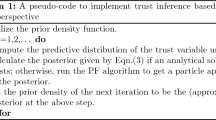Abstract
Competitive distributed systems pose a challenge to trust modeling due to the dynamic nature of these systems (e.g. electronic auctions) and the unreliability of self-interested agents. We propose a trust model which does not assume a concrete cognitive model for other agents that an agent may interact with, but uses the discrepancy between the information provided by other agents and its own experience in order to anticipate their actions. By anticipating the behavior of other agents, an agent is able to adapt more effectively to changes in the environment for its own benefit.
Preview
Unable to display preview. Download preview PDF.
Similar content being viewed by others
References
Abdul-Rahman, S.H.A.: Supporting trust in virtual communities. In: 33th IEEE International Conference on Systems Sciences (2000)
Ba, S., Whinston, A., Zhang, H.: Building trust in online auction markets through an economic incentive mechanism. Decision Support System 35, 273–286 (2003)
Braynov, S., Sandholm, T.: Trust revelation in multiagent interaction (2002)
Butz, M., Sigaud, O., Gérard, P. (eds.): Anticipatory Behavior in Adaptive Learning, Foundations, Theories, and Systems, Systems. LNCS, vol. 2684. Springer, Heidelberg (2003)
Butz, M.V., Sigaud, O., Gérard, P. (eds.): Anticipatory Behavior in Adaptive Learning Systems. LNCS (LNAI), vol. 2684, pp. 86–109. Springer, Heidelberg (2003)
Carbo, J., Garcia, J., Molina, J.: Subjective trust inferred by kalman filtering vs. a fuzzy reputation. In: Wang, S., Tanaka, K., Zhou, S., Ling, T.-W., Guan, J., Yang, D.-q., Grandi, F., Mangina, E.E., Song, I.-Y., Mayr, H.C. (eds.) Conceptual Modeling for Advanced Application Domains. LNCS, vol. 3289, pp. 496–505. Springer, Heidelberg (2004)
Carbo, J., Garcia, J., Molina, J.: Convergence of agent reputation with alpha-beta filtering vs. a fuzzy system. In: International Conference on Intelligent Agents, Web Technologies and Internet Commerce, Wien, Austria (November 2005)
Carbo, J., Molina, J., Davila, J.: Trust management through fuzzy reputation. International Journal of Cooperative Information Systems 12(1), 135–155 (2003)
Castellfranchi, C., Falcone, R.: Principles of trust for multiagent systems: Cognitive anatomy, social importance and quantification. In: Third International Conference on Multi-Agent Systems, pp. 72–79 (1998)
Conte, R., Paolucci, M.: Reputation in Artificial Societies. Kluwer Academic Publishers, Dordrecht (2002)
Davidsson, P.: A framework for preventive state anticipation. In: Butz, M.V., Sigaud, O., Gérard, P. (eds.) Anticipatory Behavior in Adaptive Learning Systems. LNCS (LNAI), vol. 2684, pp. 151–166. Springer, Heidelberg (2003)
Fullam, K., Klos, T., Muller, G., Sabater, J., Schlosser, A., Topol, Z., Barber, K.S., Rosenschein, J., Vercouter, L., Voss, M.: A specification of the agent reputation and trust (art) testbed: Experimentation and competition for trust in agent societies. In: The Fourth International Joint Conference on Autonomous Agents and Multiagent Systems (AAMAS-2005), pp. 512–518 (2005)
Gomez, M., Carbo, J., Benac, C.: Trust dynamics, motivational attitudes and epistemic actions: a curiosity-driven exploratory behavior. In: Tenth International Workshop on Trust in Agent Societies (to appear, 2007)
Huynh, T.D., Jennings, N.R., Shadbolt, N.R.: An integrated trust and reputation model for open multi-agent systems. Autonomous Agents and Multi-Agent Systems 13(2), 119–154 (2006)
Lorini, E., Castelfrnachi, C.: The role of epistemic actions in expectations. In: Second Workshop of Anticipatory Behavior in Adaptive Learning Systems (ABIALS 2004) (2004)
Schillo, P.F.M., Rovatsos, M.: Using trust for detecting deceitful agents in artificial societies. Applied Artificial Intelligence, Special Issue on Trust, Deception and Fraud in Agent Societies 14(8), 825–849 (2000)
Marsh, S.: Trust in distributed artificial intelligence. In: Castelfranchi, C., Werner, E. (eds.) MAAMAW 1992. LNCS, vol. 830, pp. 94–112. Springer, Heidelberg (1994)
Rosen, R.: Anticipatory Systems: Philosophical, Mathematical and Methodological Foundations. Pergamon Press, New York (1985)
Russell, S., Norvig, P.: Artificial intelligence: a modern approach. Prentice Hall Pearson Education International (2003)
Sabater, J.: Trust and Reputation for agent societies. Consejo Superior de Investigaciones Cientificas, Bellaterra, Spain (2003)
Sabater, J., Sierra, C.: Regret: a reputation model for gregarious societies. In: Fourth Workshop on Deception, Fraud and Trust in Agent Societies, pp. 61–69, Montreal, Canada (2001)
Sen, S., Biswas, A., Debnath, S.: Believing others: pros and cons. In: Proceedings of the 4th International Conference on MulitAgent Systems, pp. 279–285, Boston, MA, July (2000)
Wasserman, S., Galaskiewicz, J.: Advances in Social Network Analysis. Sage Publications, Thousand Oaks (1994)
Yu, B., Singh, M.: A social mechanism for reputation management in electronic communities. In: Klusch, M., Kerschberg, L. (eds.) CIA 2000. LNCS (LNAI), vol. 1860, pp. 154–165. Springer, Heidelberg (2000)
Zacharia, G., Maes, P.: Trust management through reputation mechanisms. Applied Artificial Intelligence 14, 881–907 (2000)
Author information
Authors and Affiliations
Editor information
Rights and permissions
Copyright information
© 2007 Springer-Verlag Berlin Heidelberg
About this paper
Cite this paper
Gómez, M., Carbó, J., Benac-Earle, C. (2007). An Anticipatory Trust Model for Open Distributed Systems. In: Butz, M.V., Sigaud, O., Pezzulo, G., Baldassarre, G. (eds) Anticipatory Behavior in Adaptive Learning Systems. ABiALS 2006. Lecture Notes in Computer Science(), vol 4520. Springer, Berlin, Heidelberg. https://doi.org/10.1007/978-3-540-74262-3_17
Download citation
DOI: https://doi.org/10.1007/978-3-540-74262-3_17
Publisher Name: Springer, Berlin, Heidelberg
Print ISBN: 978-3-540-74261-6
Online ISBN: 978-3-540-74262-3
eBook Packages: Computer ScienceComputer Science (R0)




